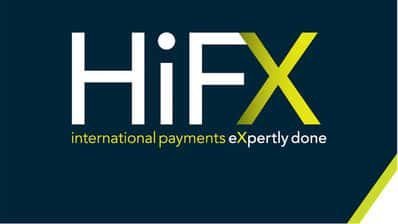Our CEO Daniel Webber sat down last week with HiFX CEO, Simon Griffin. The two chatted about HiFX's new marketing opportunites via xe.com, how voice activated technology will change the payments industry, the effect of Brexit on money transfer- and more. Read on for the full interview.

On What Differentiates HiFX in a Highly Competitive Market
I think in the corporate space, we’ve got a strong parent, being Euronet. We’re in a pretty strong financial position to be able to really look at some of the larger, more complex corporate clients. We’ve got an incredibly strong balance sheet, so we can look at some credit terms that are attractive to large corporates when they need to hedge complex deals. We can do that in a way that I think provides a level of flexibility that maybe some other players can’t offer and obviously we do it in a responsible way to manage our risk, but I think it gives us a bit of an advantage. The tricky one is consumer. I think from a consumer perspective, one of the differentiating factors we’ve got is, we still have a very strong focus on service. We are, like many of our competitors, an online business, but we recognize for key segments of our base that we have to back that up with really strong online offline service.
How XE.com's Acquisition by Euronet Will Help HiFX's Strategy
We also have an emerging advantage. Euronet recently acquired XE, and that gives us access to a previously untapped customer base. XE gets many customers users on their site to check rates and a large number of them are doing that because they need to make an international payment. That gives HiFX an opportunity to really think very differently from some of our competitors about what channels we have to acquire customers, and it gives us a kind of a different cost basis when we think about customer acquisition. This in turn enables us to maybe invest differently in product and technology, because we’ve got a different level of marketing expense to basically get a return on. I think also being part of Euronet is exciting.
Right now there is that not as much differentiation, but in the future we will look at potentially moving into adjacent products and services. Within Euronet as an example, there’s a large number of ATMs which might be attractive to some of our customers who do a lot of traveling overseas. Also within the Euronet group there are companies that process cards payments, there are even businesses within the group that issue prepaid debit cards, so there’s lots of opportunities which will in future years gives us various avenues to differentiate.

Mitigating Currency Risk for More Complex Clients
For a larger corporate customer with complex needs, when those kind of customers come to us, they don’t just need help and advice about how make a payment into a certain jurisdiction, they need a different level of engagement. They often need important advice on or about, “What’s the appropriate way to manage risk in their business?”
I think we need to play a fundamental role in partnering with those kind of customers and giving them different alternatives around how they can think about managing their risk. This is the responsible thing to do. However, fundamentally, our approach, be it a forward or a structured product is to make sure that we are giving our customer coverage for their future obligations and their future risk. What that plays out to, is if any one of our existing or potential customers was to speak to anyone in our corporate team about the structured products that we offer, they might be very surprised that we only offer three or four different structures which are very vanilla, very plain, and there’s no other kind of more exotic structures. There’s a reason for this.
We always ask ourselves when we have a conversation with a corporate about a structured product, does this product leave the customer in a position where their risk is managed? And if the answer to that question is “No,” then that is not our role. Our role at HiFX is all about helping customers manage risk, so we have a very conservative approach, we generally view structured products as part of a suite of risk management tools, rather than being an end goal in and of itself. We only got our regulatory approval (in the UK) in August of last year, which means we are very early in the journey of doing it. We have a bit more of a mature business in New Zealand that has been doing structured products for a longer period of time, but overall we haven’t got a huge number of customers yet.
One of things I have been very clear about when launching in the UK is that no one in our business has a revenue target on options, because I think once you start targeting people to sell options, bad stuff can happen. So for us it is a complimentary product to our core role in that part of the market, which is to help our customers effectively manage their risk.
Excitement for New Markets
Right now, immediately, North America generally and the U.S. specifically are very exciting. HiFX as an entity has only been in the U.S. for a couple of years, so compared to some of our competitors, we may be a little bit of a late entrant, but we’ve now got a robust product. We’ve got a good footprint of state licenses and obviously we’ve got the XE brand. I think it’s an interesting market because the banking infrastructure is different, the level of awareness of our segment, is lower and so our service offering is a bit different than some of the other markets.
There is the general challenge of demand and the awareness in the market, but I think there’s a great opportunity, particularly with the XE brand and, leveraging market insights from the Ria business which is also within Euronet. They’ve got, albeit in a slightly different segment, many years of experience in that market. And we’ve have, in our corporate entity, good knowledge and insights, good banking relationships, strong relationships with the regulators, so I think that that’s pretty exciting.
I’m personally also quite excited about Australia. I think the HiFX business is strong in Australia and New Zealand as a region, I think there’s some opportunities for us, especially with the XE brand. Australia’s quite a big market for, or a big audience for XE. I think there are some exciting things we can do there and maybe take a bit of a different approach in the market there.

Brexit Means More Than Volatility
There’s two aspects to Brexit, there’s the regulatory impact, the ability to operate angle - a lot of the UK based players operate in Europe by virtue of passporting of their UK license. It’s kind of unclear right now what that will look like post Brexit. Does that mean players like ourselves will have to go and get new licenses in Europe?
Again, one of the benefits for us is that there are many other Euronet entities which are already licensed in various European countries, so we might be able to piggyback off some of those. So there’s a piece of work that’s ongoing, a bit more broadly than just how it affects our unit, around a regulatory and compliance perspective.
Then there’s the business aspect. Like many of the UK players, we have a strong revenue stream based on British expats, with second homes they are retiring to places like Spain and France. So we are dealing with the uncertainty around that “Is that going to be a viable option to retire and easily live in France ?(for example) ” For that kind of revenue stream, which is a decent revenue stream for us, that has caused some uncertainty, and we’ve definitely seen less demand in the short term from people wanting to go and buy an overseas home. That’s the downside, but I think there’s lots of other opportunities within Europe. There’s still going to be flows. It’s not like there’s going to be no money moving between the UK and mainland Europe.
There’s going to be new opportunities. So I think that Europe is still a very exciting part of it. I think uncertainty in the short and medium term, the ongoing uncertainty as we’ve seen this week with the election being called causes some spikes in volatility, which anyone in our industry knows is a good thing in the short term. There’s the other European elections and lots of political uncertainty this year, which generally tends to drive activity like we saw in June last year so I think in the short term it’s generally quite good. And I think in the medium to long term, that it’s manageable. I am not overly concerned, it does not keep me awake at night.

Voice Activation Technology Will Change International Payments Industry
In the next five to ten years, many things will change the payments industry, but I predict one thing especially will change the way we do things. Voice. What do I mean by voice? I think this big change is more in the consumer space with devices you can talk to like Google home and Amazon Alexa, you can talk to them and ask them questions.
People wonder, how does that change our business? I believe there’s going to be adoption of those, people already use things like Siri. This is the next step up, more and more people in the kind of markets that we currently operate in are going to have those devices in their home, there are going to be people who are interested in our kinds of services who have previously gone to google to find an exchange rate and then find their way to HiFX.
Now those same customers are going to walk into their kitchen, say, “Hey Google, what’s the exchange rate today?” First, that’s going to fundamentally change Google’s advertising model, because I am not sure how you do paid search when it’s a voice activated search. There is only one ranking, which is top, the second and third are invisible, so by implication that is going to have, I think, a fundamental change in the way players in our industry get their services in front of customers. You’ve have no screen, so I think that is a piece of work and thinking that we’ve started doing, we’re very blessed that we’ve got the likes of XE who is at the forefront of some of those emerging technologies, you know they had their app out very early on and we are starting to do some thinking on how voice technology is going to be a big, big change, which is, how do you get customers aware of your service in a voice dominated world?

Oanda CEO Vatsa Narasimha On the Future of Money Transfer

Mike Massaro, Flywire CEO Interview - On Money Transfers and Receivable Payments






